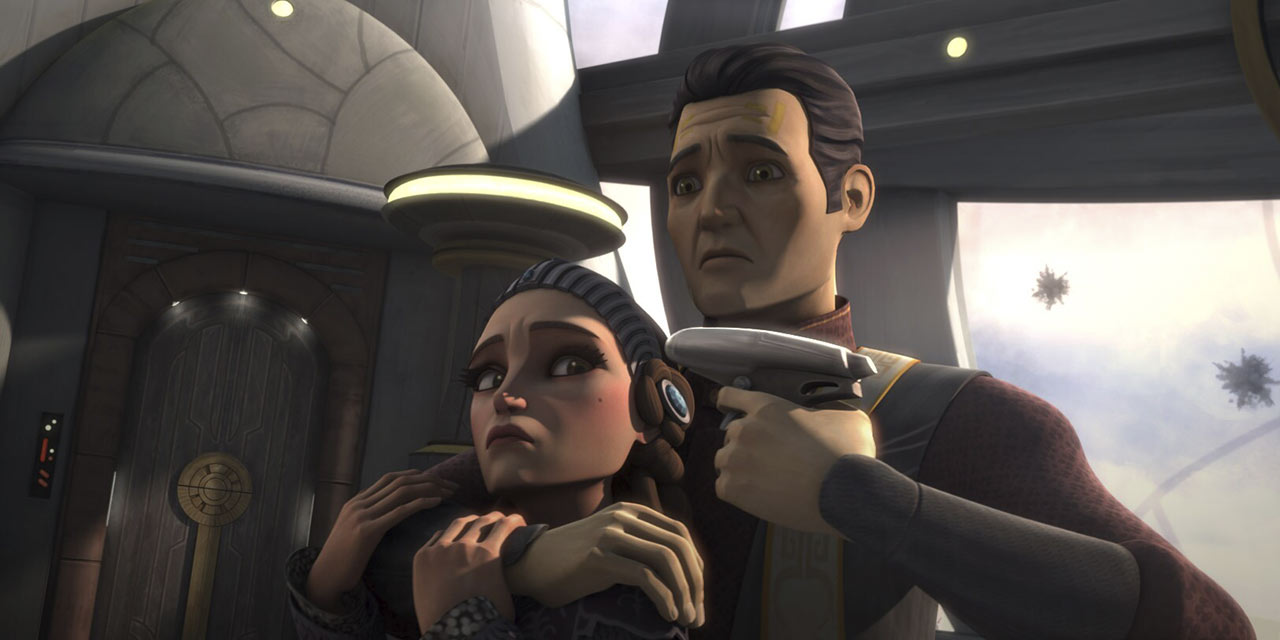‘The Lost Missions’ is a suitable subtitle for the sixth season of Star Wars: The Clone Wars. Even now, eight years after it debuted on Netflix, the season still feels somewhat lost and adrift. Season 5 was the original ending of the series after its cancellation and now the seventh is seen as the true ending to the show, and both continue to feel appropriately weighty in that respect. But the sixth season, composed of a bizarre mixture of episodes, floats in-between and often doesn’t get discussed to the same degree. The Order 66 arc and Yoda’s journey through the force that begin and close the season are well liked but the two middle stories are often forgotten about. I’ve already discussed The Disappeared, a fun two-parter I’ve always liked, but the Rush Clovis arc is one I never gave much thought and is among the episodes of the show that I found most unmemorable. Yet on my recent rewatch I came to enjoy it to an unexpected degree and feel it deserves to be celebrated rather than forgotten.
 This arc, chronicling the rise and fall of Clovis, is pure Star Wars politics. In its later seasons the series focused more on large-scale battles as the war reached its climax and so these episodes offer a welcome return to the senate chamber and all it entails. There hasn’t been an arc like this since season 3. I like the political storylines but even if I didn’t, I would appreciate the show’s attitude and commitment to them. “Oh, you don’t like this stuff and would prefer another Maul story? Too bad, it’s part of the show and part of the era. Deal with it.” It’s also fun to see Palpatine enact another of his classic overly-convoluted plots to gain control of the banks, which is hugely important in the grand scheme of things. This is a vital step to the autocratic Empire taking shape. The Sith manipulate a scandal surrounding Rush Clovis and the Muun to take control of the neutral system of Scipio, home of the Banking Clan. Who knew discussing the terms and conditions of loans could be so engaging?
This arc, chronicling the rise and fall of Clovis, is pure Star Wars politics. In its later seasons the series focused more on large-scale battles as the war reached its climax and so these episodes offer a welcome return to the senate chamber and all it entails. There hasn’t been an arc like this since season 3. I like the political storylines but even if I didn’t, I would appreciate the show’s attitude and commitment to them. “Oh, you don’t like this stuff and would prefer another Maul story? Too bad, it’s part of the show and part of the era. Deal with it.” It’s also fun to see Palpatine enact another of his classic overly-convoluted plots to gain control of the banks, which is hugely important in the grand scheme of things. This is a vital step to the autocratic Empire taking shape. The Sith manipulate a scandal surrounding Rush Clovis and the Muun to take control of the neutral system of Scipio, home of the Banking Clan. Who knew discussing the terms and conditions of loans could be so engaging?
And with politics comes Padme, a character completely underserved by the later seasons of The Clone Wars. She’s one of the stars of the prequels, a hero as much as Obi-Wan or Anakin, yet she all but disappears from the series. This is her final time to shine and the last chance to push her towards the mindset we find her with in Revenge of the Sith. Padme is usually the voice of reason and truth in Star Wars, and if people actually listened to her in the prequels everything would have turned out just dandy, but what makes this Clovis arc sing is that she is the most conflicted we’ve ever seen her, both personally and politically. Padme’s idealism is manipulated and there’s no one she can trust, not Clovis or the Banking Clan or the Senate or even Anakin. There’s no way for her to see the truth behind Palpatine’s machinations and its so unsettling to see. It reminded me of seeing Dale Cooper in the final scene of Twin Peaks, the optimistic hero suddenly at a complete loss, and it’s terrifying to witness.
 This arc offers a mashup of the overtly political and the deeply personal, with Palpatine manipulating both for his own gain. The reintroduction of Clovis, an ex-politician now working for a huge corporation, like an intergalactic Nick Clegg, into Padme’s life as they try and get to the bottom of the plot brings forth huge feelings of jealousy in Anakin. These episodes deserve to be remembered as a major step on Anakin’s path to becoming Vader. Finding Clovis and Padme together, Anakin beats Clovis to a pulp before stopping and looking at his metal hand, a moment of great Star Wars poetry. His attachment has become possession and is turning him into a monster, and the level of control he tries to exert on Padme is all too real and distressing. Even Obi-Wan picks up on it and there’s a great scene where master and apprentice try to broach the subject of relationships but they just can’t quite connect. Obi-Wan compares Anakin and Padme to him and Satine, suggesting he knows about their romance, and it really builds their relationship in a way the prequels didn’t, even if he doesn’t ultimately get through to him.
This arc offers a mashup of the overtly political and the deeply personal, with Palpatine manipulating both for his own gain. The reintroduction of Clovis, an ex-politician now working for a huge corporation, like an intergalactic Nick Clegg, into Padme’s life as they try and get to the bottom of the plot brings forth huge feelings of jealousy in Anakin. These episodes deserve to be remembered as a major step on Anakin’s path to becoming Vader. Finding Clovis and Padme together, Anakin beats Clovis to a pulp before stopping and looking at his metal hand, a moment of great Star Wars poetry. His attachment has become possession and is turning him into a monster, and the level of control he tries to exert on Padme is all too real and distressing. Even Obi-Wan picks up on it and there’s a great scene where master and apprentice try to broach the subject of relationships but they just can’t quite connect. Obi-Wan compares Anakin and Padme to him and Satine, suggesting he knows about their romance, and it really builds their relationship in a way the prequels didn’t, even if he doesn’t ultimately get through to him.
“Our relationship is built on lies and deception. No relationship can survive that.” I had completely forgotten that in the middle episode of the three-episode arc, Padme actually breaks up with Anakin. Their relationship has grown so strained that she temporarily walks away from him and its one of my favourite Padme moments in the franchise. Her taste in men is often chastised considering she falls in love with Anakin after he is nothing but creepy with her, and woos her with his tales of murdering women and children, and so this arc finally delivers justice for Padme. She has agency and can actually see things clearly for once, realising the issues that the relationship has. Her leaving him is a tantalising glimpse at what could have been! It’s triumphant but also sad knowing what could have been if it had stuck. But either way, this arc presents the Anakin and Padme relationship in the most realistic way, sometimes brutally so.
 But the arc isn’t all politics and lovers’ squabbles, there’s some meaty action to be found too. There’s the usual droid vs clone gun battles, including a shockingly dark moment where Dooku kicks a dead clone in the head as he walks by, but the true star of the action is bounty hunter Embo. Like many fan-favourite bounty hunters, Embo is memorable but actually features in very few episodes, and almost always as part of an ensemble. But here he gets time to shine as a lone operator, not only making for a fantastic silhouette on the snowy world of Scipio but also being totally successful in his mission, which includes brutally killing Tekla. The first episode ends with one of my favourite action sequences of the whole series, and certainly one of the most underrated. Again, no one talks about it! Embo chases after Anakin, Padme, and Clovis down a snowy mountain which brings forth memories of classic James Bond ski and bobsleigh chases. The design aesthetic of On Her Majesty’s Secret Service is strong with this one.
But the arc isn’t all politics and lovers’ squabbles, there’s some meaty action to be found too. There’s the usual droid vs clone gun battles, including a shockingly dark moment where Dooku kicks a dead clone in the head as he walks by, but the true star of the action is bounty hunter Embo. Like many fan-favourite bounty hunters, Embo is memorable but actually features in very few episodes, and almost always as part of an ensemble. But here he gets time to shine as a lone operator, not only making for a fantastic silhouette on the snowy world of Scipio but also being totally successful in his mission, which includes brutally killing Tekla. The first episode ends with one of my favourite action sequences of the whole series, and certainly one of the most underrated. Again, no one talks about it! Embo chases after Anakin, Padme, and Clovis down a snowy mountain which brings forth memories of classic James Bond ski and bobsleigh chases. The design aesthetic of On Her Majesty’s Secret Service is strong with this one.
The arc ends with Clovis a dead scapegoat, Anakin on a path of darkness, Padme ideologically lost, and everything coming up Palpatine as he literally laughs his way to the bank. The senate, not knowing the true implication of their actions, chant “long live the banks” and as the credits rolled, I chanted “long live the rise and fall of Clovis arc”. As you can tell, I’ve reached the end of this article and still don’t know what to call the arc but I do know that I found it to be a welcome surprise on this recent rewatch and that season six deserves to be remembered as one of the show’s best rather than just that weird jumbled one people rarely talk about.
What episodes of The Clone Wars do you think are underappreciated? Let me know in the comments and be sure to geek out with me about TV, movies and video-games on Twitter @kylebrrtt.











